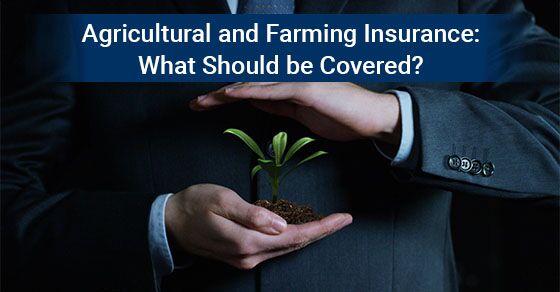
Agricultural and Farming Insurance: What Should be Covered?
Although running a farm is certainly a business, it’s not quite like any other commercial enterprise. That’s why it’s crucial to obtain insurance specifically designed to meet a farmer’s unique needs. Because many farmers work and live on the same property, agricultural and farming insurance is a blend of elements from both home and commercial policies. That’s why a loss can be both personally and financially devastating for those working in this sector.
If you’re interested in obtaining agricultural and farming insurance, you may be curious as to what it entails. We’ve taken the time to provide answers to some of the most commonly asked questions. Read on to learn how farm insurance works and what should be covered in your policy.
Is farm insurance customizable?
Like any other insurance policy, agriculture and farm insurance is fully customizable. You can choose how broad or narrow you’d like your coverage to be. Many farmers will opt for a basic policy, which includes protection for dwellings, farm structures, and machinery. Some will choose to invest in expanded coverage options. These include damages caused by falling objects, the weight of ice and snow, or burst water pipes.
Plants, trees, and shrubs are also covered under a standard policy, as long as these items are not grown for commercial use. If they are grown for business purposes, however, you’ll have to get these items insured under separate crop coverage. Ultimately, your insurance premiums will largely depend on how much additional protection you wish to obtain.
Is liability coverage mandatory?
Farm insurance provides liability protection and much like homeowners insurance, this protection is mandatory. Liability insurance covers you if you cause an accident or someone is injured on your property. Because farms contain livestock and heavy machinery, dangerous incidents can still occur no matter how careful you may be.
For example, one of your animals may run off your property and injure a neighbour or one of your workers may hurt themselves while handling a piece of agricultural equipment. Even though you didn’t actually cause these incidents, you could still be liable as the farm’s owner. Should you find yourself in this unfortunate situation, liability insurance will cover the following:
- Medical expenses
- Property damage
- Legal fees should the injured party sue
By having these safeguards in place, you’ll be able to protect your finances should an accident occur. It’s also a good idea to review what kind of liability coverage your policy provides, and what limits may apply.
Which items are covered under personal property?
Farm insurance policies will cover personal property directly related to your operation. This section of coverage is usually broken down into three categories. Policyholders have the option to choose broad coverages, or they can individually list every item. Let’s explore the categories that farm insurance typically covers.
Machinery and Equipment
Should your farming machinery or equipment become damaged, your insurance policy will cover the loss. From cotton pickers to hay rakers, nearly everything you can imagine is covered under this section.
It’s important to note, however, that damage to your equipment must have occurred under a covered ‘peril’. A ‘peril’ is a specific risk or loss covered by your insurance company. For example, if your tractor was damaged by falling ice but your policy does not cover you for such risk then your claim will be rejected.
Livestock
Animals are an important part of any farming operation, so it’s crucial to ensure they’re well-protected. Most farm insurance policies offer livestock coverage in the event your animals are hurt or killed due to a basic, covered peril. Should you want extended coverage, livestock can be protected under a much wider umbrella of perils. Some policies will even cover animals that are hit by vehicles or killed by accidental shooting.
If you have horses on your property, consider special insurance. Horses are expensive and they serve a variety of purposes, so it’s a good idea to protect your financial investment. Equine coverage can include surgical expenses or replacement costs should you lose one of your horses to disease or illness.
Farming Supplies
Many farmers keep an enormous supply of farming products on site. These can include grain, seed, animal feed, and bags of soil. Farm insurance will replace the cost of these items should they become lost or damaged. But remember, farming supplies are only covered while in storage. Once a product has been opened and used, that item is no longer under protection.
For more information on agriculture and farm insurance, please call WB White at 1-877-727-0757 or contact us here.
Leave A Comment
The comments are closed.

